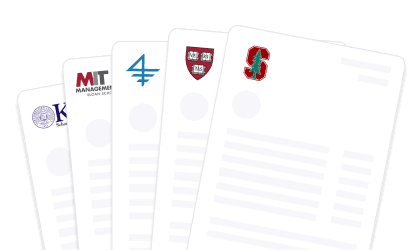How to Get Into a Top MBA Program: The Expert Guide
An MBA admit to Harvard Business School and Wharton outlines her top tips for other aspiring applicants to top business schools.

By Siri G.
HBS and Wharton Admit | 30+ M7 Admissions | Non-target Applicants
Posted July 2, 2025

Join a free event
Learn from top coaches and industry experts in live, interactive sessions you can join for free.
Table of Contents
I applied to deferred MBA programs at the Harvard Business School and Wharton School a few years ago. Coming from a non-target background, I was learning about the admissions process while I was applying. However, I was lucky to have mentors and coaches who guided me through these applications, and I’m eager to share what I learned with others.
Tips for Getting Into a Top MBA Program
#1 - Find your why
Ask yourself why you want an MBA. This seems simple (maybe even obvious) but articulating your “why” in a clear, concise, and compelling way is critical for your applications.
Not to mention, a full-time MBA program is nearly $170,000, excluding living expenses, trips with classmates, and other costs. Moreover, you are foregoing a job for two years to pursue this education. It is a significant investment of time and money so you need to establish a strong case for why you are doing this.
Identify your short-term and long-term goals. Consider where you are now in your career, and then establish the skills and/or resources you may need to fulfill those goals. How would an MBA fill that gap or accelerate your path?
Read: When to Get an MBA, When Not To – and How it Affects Your Chances of Getting In
#2 - Study for the GMAT or GRE
For some, standardized test prep is the most time-consuming component of applications, so you should get started as soon as possible.
This is easier said than done, but if you are applying to competitive programs, you should aim for the highest score possible. For a reference point, look up the average GMAT or GRE score at your target schools. Now, considering an average includes low outliers, you should ideally aim for higher. See the averages of the T15 programs below.
I highly recommend you invest time into studying for the GMAT/GRE because a strong score can not only help you get accepted into a top MBA program, but also land scholarships and potentially your next job. Some firms may ask for your score when recruiting, so your preparation is valuable.
Don’t know where to start? Take a diagnostic test for the GMAT and GRE. Either test works for top MBA programs, so pick the one you scored better on or feel more comfortable taking. Then, identify the subjects across quant and verbal that need more of your attention. Leverage free practice tests and questions online as preparation. GMAT club was a personal favorite for me.
Lastly, remember to be intentional with your studying. Answering 50+ questions every day without fully digesting your learnings is unproductive. Instead, tackle 10-15 questions a day per section. After, even if you answered a question correctly, focus on understanding WHY the correct answer is correct.
If you find that your score is stagnant or need to accelerate your test prep journey, a coach can identify your blockers and put you on a customized preparation plan to help you reach your target score sooner.
See:
- GMAT vs. GRE for Business School—Which Should You Take (and How to Ace Both)
- Top 50+ Free Resources for GMAT & GRE Practice
- Two Proven Techniques to Supercharge Your GMAT & GRE Study Sessions
- How Late Can You Take the GMAT/GRE for MBA Applications?
#3 - Demonstrate leadership
Top MBA programs seek applicants who will become impactful business leaders in the world, and past performance is typically the best indicator of future success. Therefore, you should demonstrate leadership consistently throughout your applications.
But, what does this really mean? While holding leadership positions at a school club or leading a few events at work cannot hurt, the real metric here is how do you launch and scale meaningful impact in your organization, community, and world.
This may feel daunting, but consider multiple dimensions of leadership. How do you show up as a leader in your job? In your school or community? How are you as an individual driving organizations toward positive change? Deferred applicants: how do you step up and think big, even as an intern?
From my experience, I find that true leadership has less to do with the title of your job or the complexity of your role and more to do with how you step up, serve others, and create impact.
#4 - Reflect
While each school has unique essay prompts to answer, defining your overall story will help shape your applications. To craft this story, ask yourself questions like what drives me? What am I passionate about? What struggles have I or my family overcome? What are some defining moments in my life?
These questions can help you understand your motivations, goals, and future career/life vision. Keep in mind that people who are passionate about a cause or driven by a specific purpose are more likely to accomplish what they set out to achieve, so you should be able to identify and communicate the motivations behind your aspirations.
Drafting personal statements demands tons of self-reflection. Expect to throw away many, many essay drafts. It can take weeks, if not months, to build an authentic yet intentional story. The experience may feel frustrating at times. Journaling, connecting with family or close friends, or consulting a coach are all excellent channels to embrace this reflection.
See: Giving Reflection the Time It Deserves in MBA Applications
So, What Do I Actually Need to Get In?
Top business schools, including the coveted "M7", are highly competitive programs. Stanford's acceptance rate sits at around 7% and Harvard Business School is close behind at around 11-12%. What does it actually take to get into one of these programs? Here's a brief overview:
- Competitive GPA and test scores: As mentioned above, you should aim for at least the average of your target programs. If you have a lower GPA, your test score becomes even more important.
- Good work experience: Traditional applicants should have 3-5 years of solid work experience. This means promotions and leadership, people willing to vouch for you, and real impact. Deferred applicants won't have full-time work experience, but should still have internships, projects, clubs, and other things they can speak to.
- Powerful recommenders: Will your recommenders vouch for what you claim are your strengths? Do they know you well and have anecdotes from which to pull examples?
- Extracurriculars that are connected to your why: Admissions committees want to accept people who will succeed with or without them. A cohesive story with good reasons for motivation supports the chance that they will do so. Pursue extracurriculars that align with your goals and try to get leadership experience in them.
Average GPA & Test Scores of the Top MBA Programs
To give you an idea of what to aim for, here are the average test scores and GPAs of the M7 business schools.
- Stanford GSB
- GPA: 3.77
- GMAT: 738
- GRE: 164 Q; 164 V
- Harvard Business School
- GPA: 3.73
- Median GMAT: 740
- Median GRE: 163 Q; 163 V
- Chicago Booth
- GPA: 3.6
- GMAT: 728
- GRE: 163 Q; 162 V
- University of Pennsylvania Wharton
- GPA: 3.6
- GMAT: 728
- GRE: 162 Q; 162 V
- Northwestern Kellogg
- GPA: 3.7
- GMAT: 731
- GRE: 163 Q; 163 V
- MIT Sloan
- Median GPA: 3.61
- Median GMAT: 730
- Middle 80% GRE: 157-168 Q; 155-167 V
- Columbia Business School
- GPA: 3.5
- GMAT: 730
- GRE: Not Reported
For more, read: Top 25 Business Schools' Acceptance Rates & Class Profiles
Final Thoughts
In the end, while applying to business school can be demanding, it is also an enriching opportunity to discover more of yourself. Trust the process.
These are just a few starters to help you navigate your MBA applications. If you like these tips or need more help, book a free intro call with me.
Ready to dive into the application? Here are some resources to get started:
- Top 25 MBA Programs' Application Deadlines
- The Different Types of MBA Programs—and Which One is Right for You
- The MBA Application Timeline—With Chart
- How to Write a Powerful MBA Essay—With Examples
- How to Craft the Ultimate MBA Resume
- How to Get the Perfect MBA Letter of Recommendation—With Examples
FAQs
What does it really take to get into a top MBA program like Harvard or Stanford?
- Top programs look for a strong mix of academic performance, test scores, leadership, work experience, personal impact, and a clear “why.” Your application should tell a cohesive story that connects your goals, background, and motivations.
How high should my GMAT or GRE score be for M7 MBA programs?
- You should aim to meet or exceed the average scores for your target schools. For most M7s, that’s around a 730+ GMAT or 163+ on each GRE section. A high score can offset a lower GPA, boost your scholarship chances, and even help with job recruiting later.
Can I get into a top MBA program without a traditional business background?
- Yes, many top programs value diverse experiences. What matters most is how you’ve demonstrated leadership, impact, and potential for growth. Be sure to articulate how your unique path makes you a strong MBA candidate.
How important are extracurriculars in MBA applications?
- They matter more than people think. Extracurriculars—especially when tied to your goals—can show leadership, initiative, and values. Admissions officers want to see what drives you outside of work and how you contribute to your community.
What’s the best way to explain my “why MBA” in the application?
- Connect the dots between your past, present, and future. Clearly outline your goals, the skills you need to achieve them, and how an MBA (specifically at that school) fits into your journey. Be personal, specific, and intentional.

Written by Siri
4.9
(13)
Hi there! I'm Siri. I’m originally from Philadelphia, where I graduated from Drexel University with a B.S. in Information Systems. I was admitted to HBS via the 2+2 program. Currently, I'm a Product Marketing Manager at Microsoft. My experiences lie at the intersection of tech, business, and people. If my profile resonates with you, let’s chat!
Siri has helped clients get into organizations like:




























